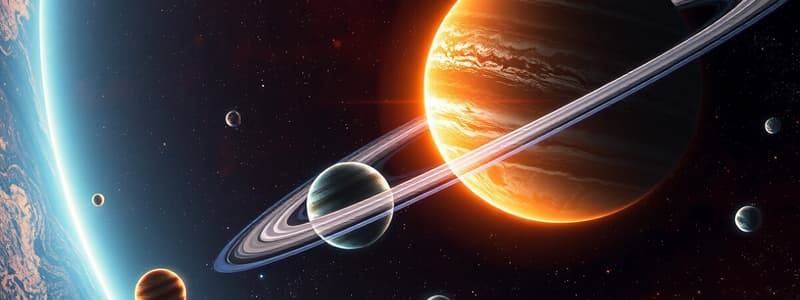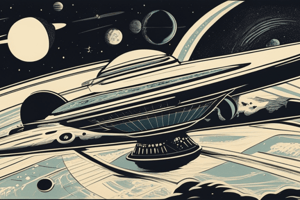Podcast
Questions and Answers
Which of the following planets are classified as terrestrial planets?
Which of the following planets are classified as terrestrial planets?
- Neptune, Earth, Saturn, and Mars
- Venus, Jupiter, Mercury, and Mars
- Mercury, Venus, Earth, and Mars (correct)
- Jupiter, Saturn, Uranus, and Neptune
What predominantly composes the gas giants in our Solar System?
What predominantly composes the gas giants in our Solar System?
- Liquid water and ammonia
- Rocky materials and ice
- Metal ores and silicates
- Gases like hydrogen and helium (correct)
How much of the total mass of the Solar System does the Sun contain?
How much of the total mass of the Solar System does the Sun contain?
- More than 99% (correct)
- Approximately 50%
- About 75%
- Less than 25%
What is the typical shape of the planets' orbits around the Sun?
What is the typical shape of the planets' orbits around the Sun?
Which of the following statements about the Sun is true?
Which of the following statements about the Sun is true?
Flashcards are hidden until you start studying
Study Notes
Overview of the Solar System
- Comprises the Sun and objects in orbit, including eight planets, moons, asteroids, and comets.
- The Sun contains over 99% of the Solar System's total mass and provides essential energy for life on Earth.
- Gravitational force of the Sun is crucial for maintaining the structure of the Solar System.
Classification of Planets
-
Terrestrial Planets:
- Closer to the Sun; include Mercury, Venus, Earth, and Mars.
- Characterized by solid, rocky surfaces.
-
Gas Giants:
- Located farther from the Sun; consist of Jupiter, Saturn, Uranus, and Neptune.
- Primarily composed of gases like hydrogen and helium; lack a well-defined solid surface.
Orbital Dynamics
- Planets follow elliptical orbits around the Sun.
- Earth takes approximately 365.25 days to complete one orbit, defining a year.
Studying That Suits You
Use AI to generate personalized quizzes and flashcards to suit your learning preferences.





